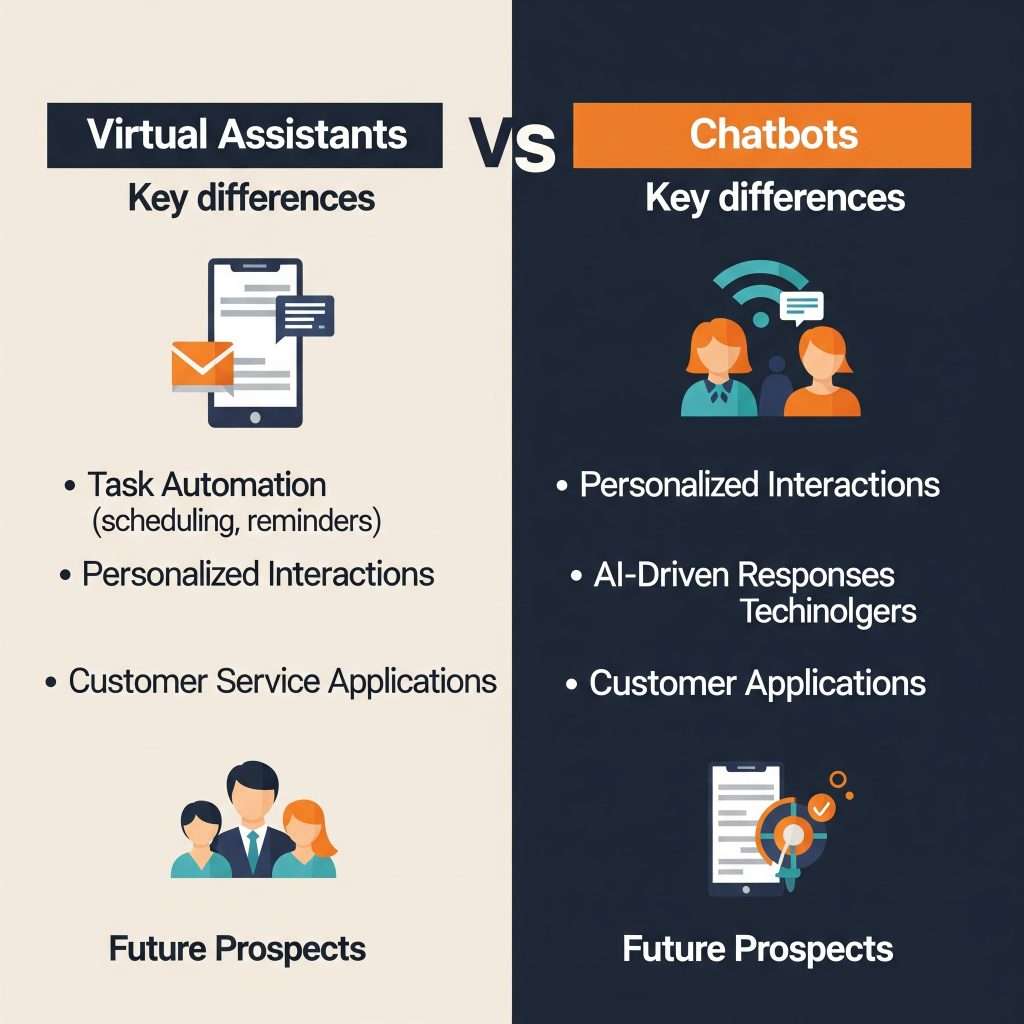Technology is driving the modern business world! It is needed for almost every moment to manage every little detail. Whether you own a small startup, a medium sized company, or a large corporation, you need to rely on technology for instance a chatbot, CRM software for customer service, managing administrative tasks, and so on.
However, is technology alone enough to manage smooth business operations or do you need something more, for instance virtual assistant services? This blog explores virtual assistant vs. chatbot, and which one is better for your business.
Table of Contents
What are Chatbots?
A chatbot is basically a software program that businesses integrate to interact with their customers. When you are running a business, you need to be available 24/7 to your existing and potential customers. These bots offer constant support, including:
- Answering customer questions
- Helping with technical assistance
- Providing user support
Chatbots can be both rule-based and AI-powered. Rule-based chatbots follow predefined rules and respond based on keywords, so they are more limited to scripted interactions. But if you consider AI-powered chatbots like ChatGPT and Google Gemini, they use machine learning and natural language processing (NLP) to:
- Understand context,
- Adapt to user input,
- Generate dynamic and human-like responses
Understanding Virtual Assistants
Virtual assistants on the other hand can be human-based and technology-based. When we talk about virtual assistant services, it basically means hiring an overseas virtual assistant or opting for an AI-powered assistant for remote assistance.
Thanks to technology, businesses can now hire virtual assistants in the USA. These professionals oftentimes are from a different country, handling day-to-day operations to complex tasks remotely.
AI-powered virtual assistants have also become popular in recent years. Powered by artificial intelligence, they automate repetitive tasks, so you and your employees can focus on more important tasks.
Virtual assistants help with multiple tasks for instance:
- Bookkeeping,
- Marketing,
- Administrative support,
- Social media management, and
- Tailored assistance.
Virtual Assistant vs. Chatbot: Key Differences
Virtual assistant vs. Chatbot! So what’s the difference and which one is better? Let’s take a look:
1. Nature & Intelligence
When we compare virtual assistant vs Chatbot , their nature and intelligence matter a lot.
Humans by nature can understand emotions better. They have the ability to show empathy, think critically when needed, and show judgment skills when dealing with a customer.
Chatbots are software agents (rule-based or AI-based) with limited understanding. They can follow decision trees or basic NLP, so they might not be the best to deal with an angry or unsatisfied customer.
AI Virtual Assistants leverage advanced NLP, context awareness, and machine learning to process complex inputs. They can learn user preferences and perform multi-step tasks. However, if we consider customer satisfaction, an overseas virtual assistant may fit the job best.
2. Functionality & Task Scope
Whether we want to agree upon it or not, opting for virtual assistant services can be more beneficial. Human VAs can handle open-ended, complex, creative, or ambiguous tasks, such as:
- Strategic planning,
- Sensitive communication, and
- Contextual decision-making
Chatbots, on the other hand, focus on specific domains, for example:
- FAQs,
- Order tracking, and
- Scripted customer support.
However, if you want to handle a broader range of tasks like:
- Calendar events,
- Reminders,
- Device control,
- Multi-turn conversations, and
- Even making calls, AI Assistants are more suitable
3. Adaptability & Learning
When you hire virtual assistants in the USA, you can rest assured that they can easily adapt to your business and learn how you work effortlessly. Especially when you hire VAs from agencies like VA Talks, you can be at ease that you are working with skilled professionals. Our talent pool is vast and we help you connect with the right people suitable for your job.
If you compare with chatbots, they are much more rigid, especially rule-based bots that don’t learn, which limits their adaptability. AI Virtual Assistants improve over time via ML. They understand context, remember preferences, and evolve their communication style, which makes them ideal in the long term.
4. Interaction Style
Nowadays, hyperpersonalization has become a necessity for every business. Their customers want something that they can relate to. Therefore, it is essential to interact with your customers in a more natural way. Overseas virtual assistants communicate via email, calls, and messaging, offering empathy, nuance, cultural awareness, and sometimes personality.
Chatbots typically use text interfaces (or guided menus) and struggle with complex conversational flows. AI Assistants support both text and voice, handle follow-up questions, retain context across interactions, and emulate a conversational flow.
5. Cost & Implementation
When comparing virtual assistant vs chatbot, we have to consider the implementation cost. Chatbots have lower development and maintenance costs, which make them ideal for narrow tasks.
The upfront cost of AI-powered can be high, however, they offer multiple benefits, making them a cost-effective option in the long run.
Last but not least, opting for virtual assistant services may seem expensive, with the salaries, onboarding, benefits, and all. But in reality, they are more affordable than you think. Many agencies let you hire virtual assistants in the USA on hourly charges, so you don’t have to pay when you don’t need them.
6. Trust, Privacy & Emotional Intelligence
Humans are emotionally intelligent. However, when choosing an overseas virtual assistant, many companies feel concerned about trust and privacy. And that is why there are NDAs. You can share your own terms and ask the VAs to sign them, to keep your company’s confidential information safe.
Artificial intelligence, while being advanced, lacks true empathy, hence communication can sound insensitive. Moreover, chatbots and AI Assistants process data at scale and can raise privacy concerns since all interactions are logged and potentially analyzed.

Chatbot vs. Virtual Assistant vs AI-Virtual Assistant:
| Human VA | Chatbot | AI‑Powered VA |
| Real people can show empathy, critical thinking, judgment | Software-based; rule-driven, limited understanding | Advanced NLP, context-aware, can learn preferences |
| Handles complex, open-ended work (strategy, sensitive communications) | Handles narrow tasks: FAQs, orders, basic support | Manages calendars, reminders, multitask workflows |
| Adapts through experience, agency training | Generally static, especially rule-based | Learns via ML, retains context/preferences |
| Email/calls/chat—offers nuance, cultural empathy | Text-based, guided menus—limited flow | Text & voice with follow-ups & natural flow |
| Hourly/salaried; flexible, human touch | Low cost; ideal for simple tasks | Higher setup cost; scalable & efficient long-term |
| Privacy can be protected via NDAs and custom terms | Processes data at scale, privacy concerns due to logging and analysis | Can process large amounts of data, but all interactions recorded, raising compliance/privacy risks |
Wrap Up
There’s no doubt that technology has progressed rapidly. If we compare virtual assistant vs chatbot, an overseas virtual assistant may be more suitable for the job. But companies need to understand that depending on your project needs, your requirements may change.
If you are tired of managing daily activities alone, an AI virtual assistant might be more suitable for you. And sometimes a hybrid model is the best solution to deal with your customers. Know your requirements and weigh your options to learn what’s best for you.
FAQs
Q.1. What’s the difference between a chatbot and a virtual assistant?
Chatbots are task‑specific (e.g., answering FAQs), while virtual assistants handle a variety of tasks across various platforms, making them more flexible.
Q.2. Are AI-powered chatbots the same as virtual assistants?
While they both use AI, chatbots are limited to predefined tasks, whereas AI virtual assistants support broader, multi-step workflows.
Q.3. Which is better for my business: a chatbot or an overseas virtual assistant?
Well, it depends on your needs! Chatbots fit high-volume customer support; overseas virtual assistants help with more complex personal or administrative tasks.
Q.4. Are chatbots or virtual assistants better for customer service?
Chatbots can efficiently handle repetitive queries (order tracking, FAQs). But if you want a more personalized service, hire virtual assistants.




